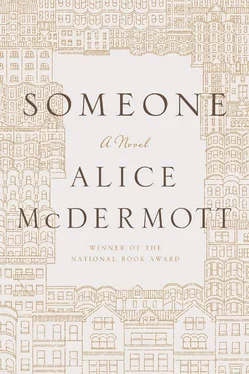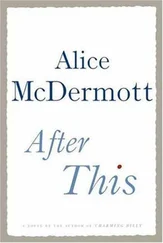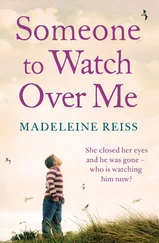She raised her chin and even smiled a little, with the kind of subtle admiration she usually turned on Gabe. “Do you now?” she asked me. A kind of mirth entered her eyes. “What else do you know?”
I recited the entire phrase: “For better, for worse, for richer, for poorer, in sickness and in health, till death do us part.” Until I saw my mother impressed by my knowledge, it never had occurred to me to wonder how I knew the words, from school, from the movies, from my friends. When she asked me, I said, “From my friends.”
My mother bent her head again and said, “Your friends talk to you about marriage, then. About what goes on.” I believe she was blushing.
I turned away from her to pick up my brush from the dresser. I began to brush my hair, still damp from my bath. I could see her reflection in my dressing mirror, sitting straight-backed on the edge of my bed, her hands in her lap. “Oh sure,” I said casually.
“Then you know,” my mother said, “about what goes on.” And in the mirror I saw I still carried the flush from the hot water in the tub. “Oh sure,” I said, not certain even then what I was admitting to.
From behind me, I heard her sigh. “You’re growing up.” She said it much as she had said it that afternoon, both amused and melancholy, and not a little impatient. I heard the familiar squeak of the bedsprings as she stood. “It’s good that you know these things.” Her voice, like the sound of the springs, seemed to move upward into the room, as if relieved of some weight. “We’ll go downtown after Mass tomorrow,” she said. “Get to bed now.”
In the morning, after church, the three of us took the trolley to the hospital. My father carried a small black satchel. In the lobby, he put his hand to the top of my head and said, “Be a good girl now”—rolling his tongue the way he did, tasting the sweetness of the joke. He leaned down, and I kissed his cheek, which was smooth-shaven and smelled cleanly of bay rum. And then I nearly knocked his hat off his head as I threw my arms around his neck. He patted my back, and then placed his two hands on my shoulders as he used to do outside the speakeasy, as if to keep me there, unmoving, while he went upstairs with my mother to get settled in.
When she came down again, the two of us walked outside and crossed the street, and then looked up at the big building. She pointed. It took me some time to find the right window. And then I saw him waving to us from behind the sky’s reflection.
In the sunshine on the sidewalk in front of Mary Star of the Sea, a Sunday morning in early June when I was seventeen, Walter Hartnett said, “What’s wrong with your eye?”
Our mothers were talking, purses over their arms and hats on their heads. The sun bright off the black glass of windshields, the tin fenders, the pocketbooks of the women in that after-Mass crowd, off the white sidewalk and the road and even the fading church bells. Bright off him, too, when I looked up at him: the dark hair and that pale face, and then the gray eyes turned translucent in the sunshine.
“Nothing wrong with it,” I said. “This one just screws up on me sometimes. When the sun’s strong.”
“Well, don’t let it,” he said. “It makes your whole face look funny.”
Back home, before the tiny mirror above the narrow bathroom sink, I saw it: the way the right eye, screwed closed, pulled at the corner of my mouth so that I looked like a tough with a wad of chewing gum in my cheek. How my glasses, thick bottle bottoms, stayed steady on my nose despite the contortions of the face behind them.
I was reminded for a moment of Walter Hartnett as a boy, the way he had held his hands behind his back, placid and wise beside blind Bill Corrigan. I was reminded of the sagacity with which Walter would nod whenever Bill Corrigan made his impossible calls. As if only he and the blind man could see what the rest of them could not.
I opened up the offending eye. Smiled at the mirror and said, “How’s that?” Took my glasses off entirely and smoothed the skin under my eyes and said, “Is that better?” Walter Hartnett. Mister Hartnett. Brushed my hair back—dark and thick but, like the scrinching eye, with a mind of its own—and peered into the small mirror, which showed me now only a smear of face and hair and smiling teeth, made my eyes as large as I could make them, and said out loud, “Is that better, Mr. Walter Hartnett?”
When he called that afternoon—his voice a small and miraculous thing inside the big black receiver—he apologized if he had been rude. It was none of his business, he said, what I did with my eyes. Later, in reconstructing the conversation in what was to be the first night of my life when sleep escaped me entirely, I replied, “Not at all,” but in truth, I’d barely murmured a word. “I’m bossy sometimes,” he said. “I get it from where I work. They give me a lot of responsibilities. Do you want to go out for a soda?”
When my daughters began dating, I told them, “Here’s a good rule: If he looks over your head while you’re talking, get rid of him. Walter Hartnett …” But by then they would throw up their hands. “Jesus, Mom, no more Walter Hartnett stories.”
Walter Hartnett on the candy-store stool looked over my head every time a figure appeared in the cornered doorway behind me. It got so I felt I could see them, too, the other people coming in out of the evening sun, as if I could feel their cool shadows upon my back as they stood for a moment in silhouette and Walter looked beyond me to see who it was. “Hiya,” he would say if he knew them—I might have been in mid-sentence—“How are you?” He’d shoot a finger up beside his face to signal a hello. Or just stare—this was for entering strangers—his eyes following whoever it was into the candy store, wondering, calculating, assessing as a man alone might do—a man alone and unguarded in the brazenness of his gaze. And then his gray eyes would drop to my face once more. There would be a second of utter indifference, boredom perhaps, and then a slow dawning—Oh yeah, you—a slow warming as his attention returned to me once again—Well, I’m happy to be here with you—sometimes even as much as a smile entering those dark-lashed eyes, and then they would flick up again, over my head, to greet with a raised chin, or only to observe, whoever it was whose shadow had fallen over my back. Then his eyes would return to my face, unseeing once more, and then the slow recognition would begin again.
It could only have been second nature to him, this veering attention. He couldn’t have calculated its effect. But it was, for me, by turns, devastating and thrilling, so that by the time our sodas were finished and we slipped from our stools, I was unsteady on my feet from the dizzying turns my hopes, my heart, had been taking. My pumps caught themselves, somehow, against his built-up shoe, and in the tangle as I fell into him, he slipped his warm hand under my arm. “Not very graceful,” he said. But we both were blushing.
Out on the sidewalk again, we walked without touching, although most of the other people on the street seemed to be couples, young and old, walking arm in arm. The Sunday-evening promenade. The sun was setting with that thick orange light, but the sky to the east was still a cool Sunday-morning blue. There was only the slightest irrhythm in his gait, a nearly imperceptible hitch, not a limp. Had he turned right and walked me silently straight to my stoop, I would have followed, my head down, and said nothing more. But he turned left instead, and I went with him. He was talking about his job. That it was steady and he was lucky to have it. He named some friends who had jobs he wouldn’t wish on a dog—with the B.M.T., with the diocese, on a barge that plied the harbor. He told me to forget about lower Manhattan and head to Borough Hall when the time came to look for work. Who wanted to work in New York City? All the while his eyes following the other couples we passed, or darting to the other side of the street to see who was there.
Читать дальше












